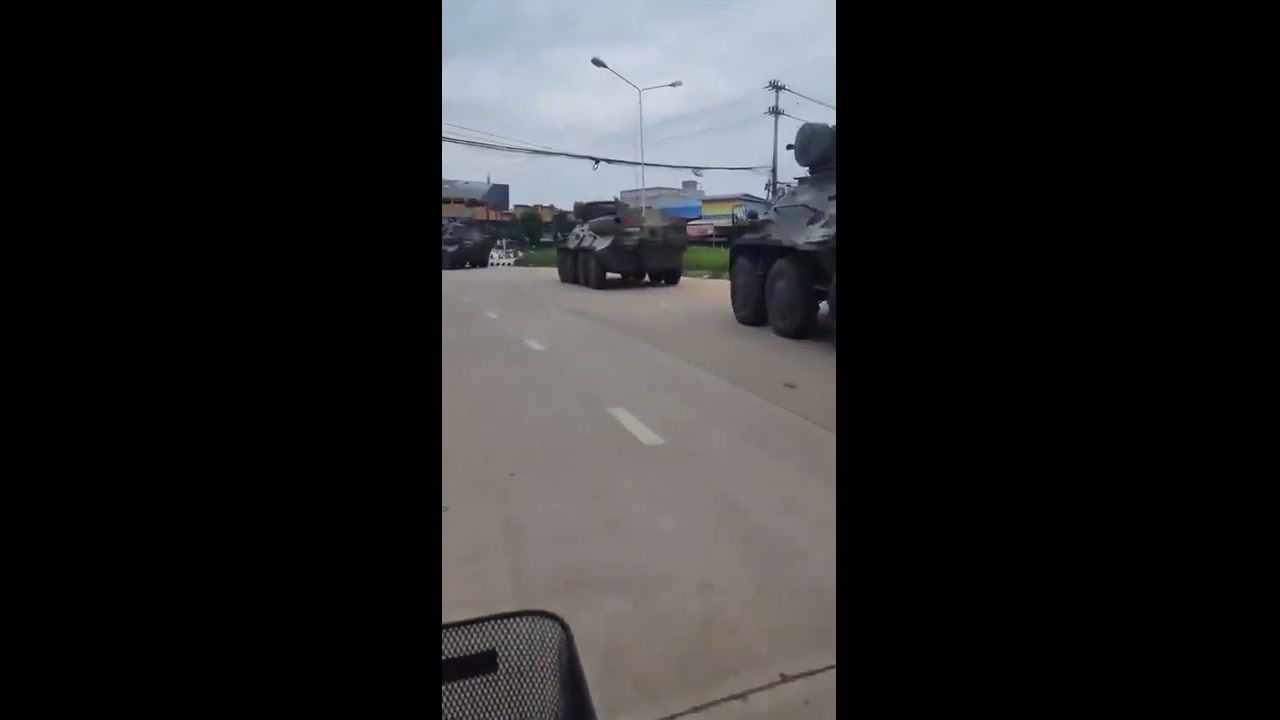![[Video] Gunfire between Iraqi security forces and Sadr militias in Baghdad](/api/image/thumbnails/thumbnail-1768343508874-4redb-thumbnail.jpg) 0:20
0:20Royal Thai Army Deploys Ukrainian-Made APCs to Cambodia Border Amid Escalating Tensions

About This Video
The Royal Thai Army has deployed Ukrainian-made BTR-3E1 APCs to the Cambodia border, escalating tensions amid ongoing clashes. This strategic move raises fears of a wider conflict in Southeast Asia.
Royal Thai Army Deploys Ukrainian-Made APCs to Cambodia Border Amid Escalating Tensions
In a significant military maneuver, the Royal Thai Army has commenced the deployment of additional reinforcements to the border with Cambodia, utilizing Ukrainian-made BTR-3E1 armored personnel carriers (APCs). This development comes amid ongoing clashes and notable advances by Thai forces, raising concerns over the potential for heightened conflict in the region. The footage capturing this deployment has sparked widespread attention, as tensions between the two Southeast Asian nations continue to escalate.
The backdrop to this military escalation is rooted in a series of territorial disputes and historical grievances that have plagued Thailand and Cambodia for decades. The recent seizure of the strategic Phu Makuea summit by Thai troops, which has been characterized as an aggressive move, has intensified the situation further. As previously reported, the ongoing hostilities and military posturing have not only drawn the attention of local governments but have also attracted international observers keen on understanding the implications of this conflict for regional stability.
Eyewitness reports indicate that the deployment of these Ukrainian-made APCs is not merely a show of force but a calculated strategy by Thailand to bolster its military presence and secure its territorial claims. Analysts suggest that the use of advanced Ukrainian military equipment underscores Thailand's commitment to modernizing its armed forces and preparing for potential confrontations. In a statement, a spokesperson for the Royal Thai Army emphasized that the reinforcements are essential for maintaining national security and protecting sovereignty in the face of perceived threats from Cambodia. With this military buildup, the stakes have been raised, and both nations find themselves at a critical juncture.
This current situation mirrors similar tensions observed globally, where military posturing often precedes diplomatic negotiations. Experts argue that the deployment of military assets can sometimes lead to unintended consequences, such as miscalculations that escalate into open conflict. In historical contexts, such as the territorial disputes between Russia and Ukraine, significant military movements have often been followed by heightened clashes. As noted in recent developments regarding Ukrainian drones striking key Russian facilities, the interplay between military strength and diplomatic dialogue is complex and fraught with risks.
The implications of Thailand's military actions are profound, not only for its relationship with Cambodia but also for regional stability in Southeast Asia. Should the situation deteriorate further, it could result in a humanitarian crisis, drawing international condemnation and potentially inviting intervention. Observers are calling for both nations to engage in dialogue to de-escalate tensions and seek a peaceful resolution. The international community is watching closely, as the outcomes of this situation could set a precedent for how similar disputes are handled in the future.
In conclusion, the recent deployment of Ukrainian-made APCs by the Royal Thai Army signifies a critical moment in Thailand-Cambodia relations, with the potential for significant repercussions. As both countries navigate this complex landscape, the focus will be on whether diplomatic channels can prevail over military might. The coming weeks will be pivotal, and the need for constructive dialogue has never been more urgent. Stakeholders from both nations must prioritize peace and stability to avert a potential crisis that could have far-reaching consequences.
More Videos
![[Video] Gunfire between Iraqi security forces and Sadr militias in Baghdad](/api/image/thumbnails/thumbnail-1768343508874-4redb-thumbnail.jpg) 0:20
0:20![[Video] Greenland Prime Minister states preference to remain with Denmark](/api/image/thumbnails/thumbnail-1768343466645-jiogu-thumbnail.jpg) 0:21
0:21[Video] Greenland Prime Minister states preference to remain with Denmark
![[Video] Heavy clashes and gunfire reported in Baghdad, Iraq](/api/image/thumbnails/thumbnail-1768342239932-848qsh-thumbnail.jpg) 0:07
0:07[Video] Heavy clashes and gunfire reported in Baghdad, Iraq
![[Video] Mexican President Sheinbaum: US intervention cost us half our territory](/api/image/thumbnails/thumbnail-1768341060521-7mbwia-thumbnail.jpg) 0:48
0:48[Video] Mexican President Sheinbaum: US intervention cost us half our territory
![[Video] Federal officers deploy sting balls and flash grenades at Whipple Building](/api/image/thumbnails/thumbnail-1768340555229-vhfcc-thumbnail.jpg) 1:06
1:06[Video] Federal officers deploy sting balls and flash grenades at Whipple Building
![[Video] Trump gestures and curses at Ford worker who called him 'pedophile protector'](/api/image/thumbnails/thumbnail-1768340459496-0wsk2e-thumbnail.jpg) 0:12
0:12